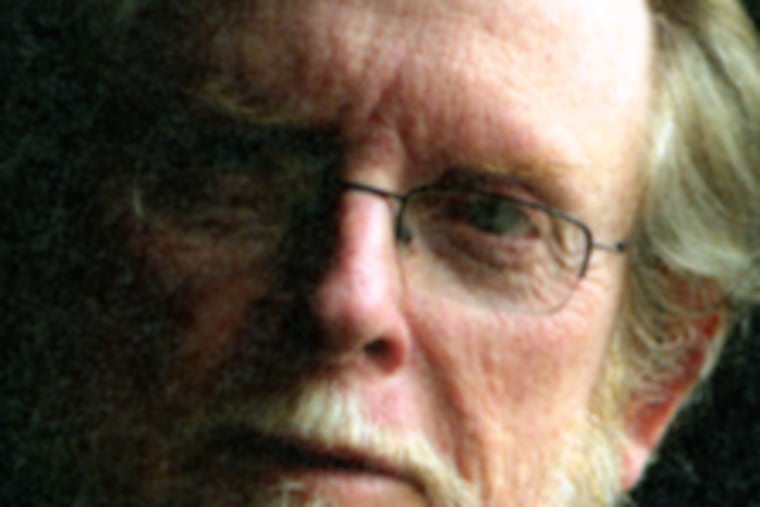Rain-soaked patrol for Nazis
A soldier's tale, set in Italy, where no one turns out to be what he seems.

By Richard Bausch
Knopf. 192 pp. $19.95
Reviewed by Michael Harrington
Richard Bausch is one of our country's best short-story writers, and his fine new novel,
Peace
, has the taut, spare power of the shorter form.
It's a war story, set in Italy - Hemingway territory, the land of
A Farewell to Arms
- during World War II.
The campaign in Italy was surprisingly devoid of literary renderings in its time. One can think of Harry Brown's
A Walk in the Sun
(more famous as a film) or John Horne Burns' neglected
The Gallery
, but little else.
Italy was a second front that the British thought necessary and the Americans reluctantly agreed to. It was a long, evil slog up the mountainous peninsula, with the Germans fiercely contesting each valley and peak. Perhaps the meat-grinder landings at Anzio and the wholesale destruction at Monte Cassino were too full of the quotidian nastiness of war to be uplifting or inspiring - and, later, if one wanted to write about slow, evil slogs, there were Korea and Vietnam. So, even during the war, the literature of the Italian campaign was of the post-combat, conciliatory tone of John Hersey's
A Bell for Adano
.
Of course, any new novel written about that war will ultimately end up being just as much about this war, with shadowy enemies who refuse to stand and fight and supposed innocents just as likely to be deadly combatants.
Bausch's novel is a walk in the rain, taking place near Cassino, where an undermanned recon patrol searches the sodden mountain paths for signs of the Nazis or unrepentant, homegrown
fascisti
.
Bausch's prose has the power of poetry:
"Toward sundown, they stopped where a fast-moving stream came up to the edge of the road on the left and went on, veering again into the trees. The road wound sharply to the right and out of sight beyond the rise of a steep hill. There were trees on that side, too. Through the trees to the left was the water, metal gray and solid looking, with little quick flags of white in it. Now and again a tree branch came gliding past, and then they saw boards and other debris, followed by the legs of a horse, the animal being pulled along in the swirling eddies, bobbing in and out of the folds of water, the legs frozen in an attitude of flight. The river churned and roared. They all moved to the right of the road and the base of the hill, where the wet black branches provided some meager shelter. All the trees were beginning to look as though they were encased in glass. There were tank tracks in the mud and stones of the road."
Bausch's main character, Robert Marson (a Hemingwayesque name) is one of the infantrymen, a corporal older than the other soldiers, a 26-year-old devout Catholic with literary aspirations and a philosophical bent.
The soldiers come upon a cart. They overturn it, looking for contraband, and find a German hiding. There is shooting, and a woman with the enemy officer ends up dead. The men are shocked by the death, and a debate ensues about whether the killing was justified or murder.
Later, they find another peasant, another cart. There is no contraband, but the old man is pressed into service as a scout to lead Marson over a mountain to find the Germans and report back. He takes Asch, a sardonic, depressive cop's son from Boston, and Joyner, a bigoted teen farmboy and would-be big-band clarinetist.
There follows a harrowing journey into the snowy upper reaches, as the men deal with fatigue, memories of home, and fear. They wonder about the people they are liberating, about whether to report the woman's killing, about the justifications of the war itself.
Marson takes solace in his faith, in the battle of ideas. "The ideas are just excuses," Asch retorts. "Just - we're getting better and better at killing. That's what it
is
. We've got the mechanisms for wider and more efficient killing. It's got nothing to do with ideas."
This is a soldier's tale reduced to its essence, a battle for survival with the hope that one's training may be sufficient when the moment to fight unexpectedly arises.
In the end, no one turns out to be what he seems. The liberators may be oppressors, the liberated may be insurgents. There is impressive heroism and soul-grinding, pointless tedium - and then it's back to the slog, to wondering if the next peasant is an innocent or a killer.
Again, this war.